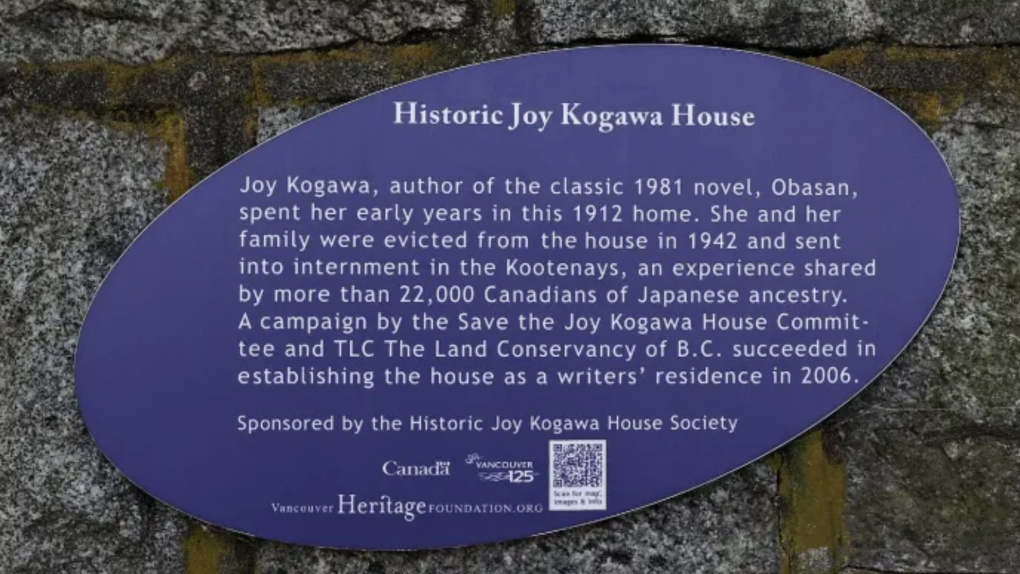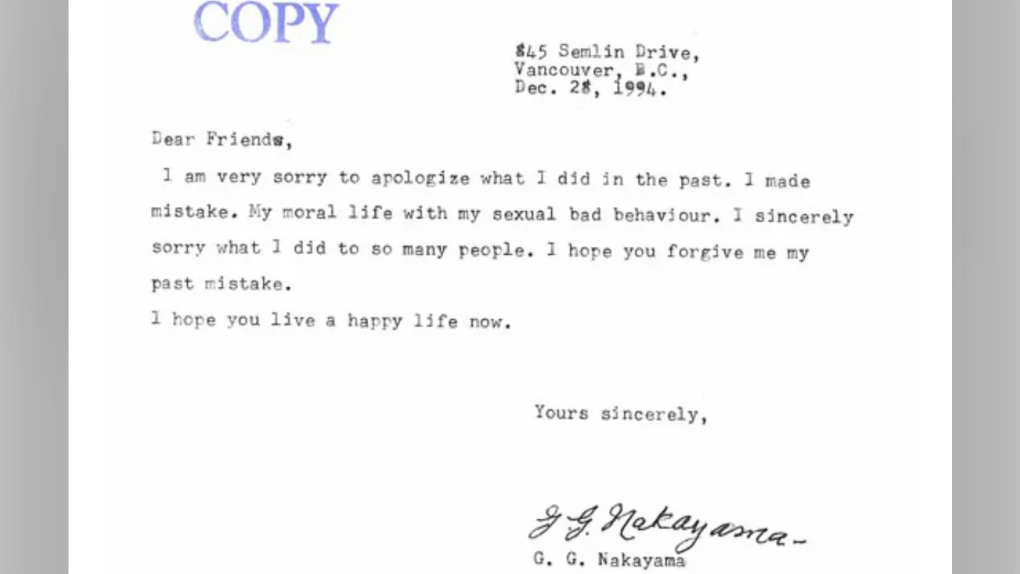Heritage status for Vancouver home with troubling abuse history on hold
 The Historic Joy Kogawa House has a 'complicated history' that includes the author's father sexually abusing children when he was a priest, according to its website.
The Historic Joy Kogawa House has a 'complicated history' that includes the author's father sexually abusing children when he was a priest, according to its website.
Warning: This story contains content that may be disturbing to some readers.
Vancouver city council has quietly removed a motion to give heritage status to the Historic Joy Kogawa House, upsetting those who wanted to speak at the meeting to shine a light on the less-known and much darker legacy of the author's father and his sexual abuse of children.
The city was set to consider a heritage designation for the South Vancouver home on Tuesday. The house is a place where writers can attend workshops and visitors can learn about Kogawa's literary work and about the Japanese-Canadian family's experience of internment during World War II.
 The plaque outside of the South Vancouver home describes the author's family's experience of being interned during World War II.
The plaque outside of the South Vancouver home describes the author's family's experience of being interned during World War II.
But since 2006, a group in Vancouver has been working to make public the stories of survivors abused by Kogawa's father – Gordon Goichi Nakayama, an Anglican priest – and to push for those abuses to be acknowledged as part of the house's history.
'ACKNOWLEDGING THIS HISTORY IS IMPORTANT'
Their work led to this abuse being mentioned on the house's website.
"In talking with many Japanese Canadians, we have come to understand that Gordon Goichi Nakayama also betrayed his position of trust and authority and brought considerable harm to the Japanese Canadian community. While owning and living in the house that now celebrates the work of his daughter, Joy Kogawa, we understand that Gordon Goichi Nakayama sexually abused many children," the page says.
"In acknowledging this truth, Kogawa House is committed to working with the community to help the healing process for those individuals and families affected by Nakayama’s actions. We understand that acknowledging this history is important to healing."
While some survivors lived in the Marpole neighbourhood where the home still stands, Nakayama travelled extensively and was allowed, as a priest, to visit families that had been interned in camps across the country.
"As isolated families living on remote farms, Gordon Goichi Nakayama often stayed overnight when visiting. Those children were the most vulnerable," an online statement says.
CHURCH ISSUES APOLOGY
Nakayama, now deceased, was never charged, tried or convicted. In 2015, the church issued an apology. It notes that in 1994 Nakayama wrote a short letter to the Diocese of Calgary offering an apology and saying that he had engaged in "sexual bad behaviour" and was "sincerely sorry" for what he did " to so many people."
 A 1994 letter from Gordon Goichi Nakayama is posted online alongside an apology from the Anglican church.
A 1994 letter from Gordon Goichi Nakayama is posted online alongside an apology from the Anglican church.
Upon receiving the letter, the apology says, Nakayama was charged with "Immorality" by the diocese and chose to resign.
"We deeply regret this apology was not delivered to the Japanese Canadian community at the time of Mr. Nakayama’s confession, the charge of immorality, and his subsequent resignation from the exercise of priestly ministry," it reads.
"On behalf of our dioceses, we express our deep sorrow and grief for harm which Mr. Nakayama did, and we apologize to all whose lives have been affected by Mr. Nakayama’s actions."
Currently, the Healing Fund for Japanese Canadians works to administer $600,000-worth of funding from the church to support survivors, families and community members impacted by Nakayama's abuse while also working to "challenge the decades-long history of secrecy surrounding these crimes." That work has included working with Joy Kogawa House on how to reckon with its own history.
REPORT WITHDRAWN, TAKEN OFFLINE
Peter Wallace, project manager, says the group was never told the city would be seeking a heritage designation for the building. Once the organization became aware, he says they were distressed to see no mention of Nakayama in any of the city documents.
While those documents were available Sunday, they were no longer online Monday.
"Those motions, by-laws, and agreements discuss the heritage value of 1450 West 64th (Avenue). It is within these main documents where the disclosure of Mr. Nakayama's abuse history is needed. The current application and recommendation for approval obfuscate clergy sexual abuse history," Wallace said in an email Sunday.
"I do not know how this information failed to make it to the City of Vancouver."
Wallace and others were in the midst of preparing remarks to deliver at Tuesday's meeting when they learned the item had been withdrawn. While each person was planning to bring their own perspective to the matter, Wallace says they were all united in opposing the recommendation.
"It would have been a valuable opportunity for the abuse history to become part of the public record at City Hall, and to have registered speakers have their perspectives recorded on this issue," he said in an email Monday.
In a statement, a city spokesperson said the agenda item was withdrawn "to further review the report and associated documents in order to address concerns raised by the community and to ensure a complete history of the site and the concerns over its heritage protection are fully understood and acknowledged as part of staff reporting to council."
No date has been set for a new report to be presented.
Council will adjourn for the summer after the meeting on July 22 and is not set to meet again until after the municipal election in October.
CTVNews.ca Top Stories

Trudeau talks border, trade in surprise dinner with Trump at Mar-a-Lago
Prime Minister Justin Trudeau discussed border security and trade during a surprise dinner with U.S.-president elect Donald Trump at Mar-a-Lago in West Palm Beach, Fla. on Friday evening, according to senior government sources.
Man who died trying to help stranded motorist identified as Khalid Farooq, father of 5
The man who lost his life trying to help a stranded motorist Wednesday has been identified as Khalid Farooq.
W5 Investigates 'I never took part in beheadings': Canadian ISIS sniper has warning about future of terror group
An admitted Canadian ISIS sniper held in one of northeast Syria’s highest-security prisons has issued a stark warning about the potential resurgence of the terror group.
Are scented candles bad for you? What the science says
Concerns about the safety of candles are rooted in the chemical reactions that occur when you burn them, as well as in the artificial fragrances and colorants that contribute to the various scents you may love.
It's time for a good movie this holiday season, here's what's new in theatres
This holiday season has a special edition at the theatres with movies "that everyone has been waiting for," says a movie expert from Ottawa.
Poilievre suggests Trudeau is too weak to engage with Trump, Ford won't go there
While federal Conservative Leader Pierre Poilievre has taken aim at Prime Minister Justin Trudeau this week, calling him too 'weak' to engage with U.S. president-elect Donald Trump, Ontario Premier Doug Ford declined to echo the characterization in an exclusive Canadian broadcast interview set to air this Sunday on CTV's Question Period.
Emboldened 'manosphere' accelerates threats and demeaning language toward women after U.S. election
An emboldened “manosphere” has seized on Republican Donald Trump ’s presidential win to justify misogynistic derision and threats online.
Montreal researchers make breakthrough discovery in fighting HIV
Researchers in Montreal have made a breakthrough discovery in HIV research by finding a way to expel the virus from its hiding places and destroy it.
Cucumbers sold in Ontario, other provinces recalled over possible salmonella contamination
A U.S. company is recalling cucumbers sold in Ontario and other Canadian provinces due to possible salmonella contamination.
































